Researchers at the University of Waikato are turning to the ocean to clean up our freshwater environment, create sustainable business opportunities and develop new life saving medicines while restoring our marine ecosystems in the process.
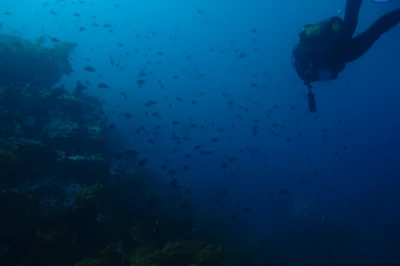
Toitu te Moana Toitu te Tangata; Sustainability of the sea, sustainability of the people is the driving force behind marine research at University of Waikato.
While our marine environments are declining at a rapid rate they also sustain us environmentally, culturally and economically and if this is to continue we need to work hard to reverse the decline, says Professor of Marine Science, Kura Paul-Burke.
She leads a $13 million research project incorporating mātauranga Māori into marine restoration funded by the Ministry of Business Innovation and Employment's Endeavour Fund.
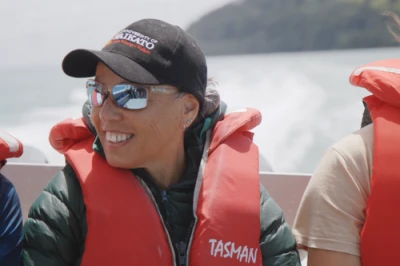
Professor of Marine Science, Kura Paul-Burke says our marine environments sustain us environmentally, culturally and economically.
The Pou Rāhui, pou tikanga, pou oranga: reigniting the mauri of Tīkapa Moana and Te Moananui-ā-Toi project, will work with 5 iwi partners to investigate and share localised knowledge and tikanga Māori approaches, supporting a deeper understanding of rāhui, marine management and restoration action using mātauranga-ā-iwi and modern scientific tools.
“We are growing our whānau of Māori post-grad students doing their masters and PhDs prioritising mātauranga Māori alongside marine science. It is about celebrating different knowledge systems to help our environment,” says Professor Paul-Burke.
Professors Chris Battershill and David Schiel are leading another project incorporating mātauranga Māori in work to improve the health of the coastal environment and contribute to reversing the decline of New Zealand's kelp forest ecosystems. Toka ākau toitu Kaitiakitanga - building a sustainable future for coastal reef ecosystems received $8.8m from MBIE.
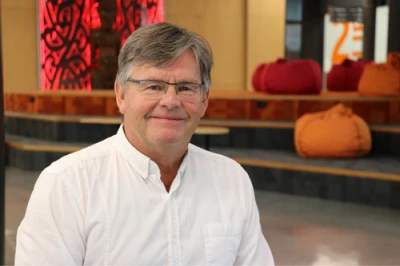
Professor Chris Battershill is part of the team leading a project incorporating mātauranga Māori in work to improve the health of the coastal environment.
Focusing on kelp forests across four economically, ecologically and culturally important regions, the project embraces the connections between the mountains and the sea to establish sustainable intergenerational management strategies for kaimoana and marine health. Enhancing the resilience of coastal reef ecosystems in the face of increasing sedimentary inundation from land runoff in our fast changing climate, is a prime target.
These new research projects continue to build on a strong multidisciplinary marine science capability in Tauranga. The University has made significant investment in a new marine science research base at Sulphur Point and built New Zealand’s first state-of-the-art aquaculture facility for macroalgae cultivation in 2020. Since then it has also been granted a seaweed and freshwater algae fish farming license enabling large scale seaweed research to enrich our blue economy.
“There are just so many opportunities for cultivating, developing and commercialising seaweed,” Dr Marie Magnusson says. “The facilities we have and the industry partnerships we have grown offer so many great opportunities for our students in a growing industry.”
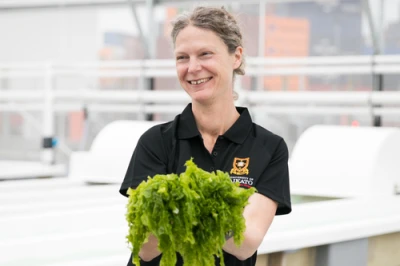
Associate Professor Magnusson is trailing the use of algae to clean treated wastewater alongside Bay of Plenty company Aqua Curo.
Research led by Associate Professor Magnusson has already seen the launch of trials using algae to clean treated wastewater alongside Bay of Plenty company Aqua Curo, and in another project alongside AgriSea they are using sea lettuce or Ulva to remove nutrients from river estuary water at Waihou on the Firth of Thames.
“The industry connections we have are great for our students because they get to see that all the nitty gritty work they are doing in the lab has application in the real world and is solving real world problems,” says Dr Magnusson.
Marine Science and aquaculture programmes at the University of Waikato Tauranga campus take a sustainable and culturally sensitive approach to this growth industry and the Bay of Plenty provides a unique living laboratory for students to learn.
The University also launched its Blue Green Lab in Tauranga in 2022 providing a space for University staff and students to work on projects with and for local companies across automation, robotics, artificial intelligence and biotechnology for the horticulture and marine sectors and environments.
The lab also provides a space for engaging with future students and the local community, and reinforces the University’s commitment to growing investment and activity in support of community and industry in the region.
Our strong industry connections and the real world application of research whether for commercial purposes or to help inform environmental management is a real strength at the University, says Dr Magnusson.
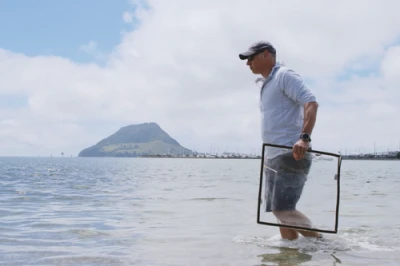
Professor Conrad Pilditch oversees a team of PhD students researching New Zealand estuaries.
Professor Conrad Pilditch oversees a team of PhD students researching New Zealand estuaries in the hopes their findings will contribute to national and worldwide efforts to monitor and improve estuary health. Dr Shari Gallop is also part of the team. Her research considers how to restore our estuaries in the face of climate change.
Improving the health of our estuaries, the nurseries of the sea that sit at the interface between our marine and freshwater environments is key to improving our marine environments, says Professor Pilditch.
The oceans represent a hyperconnected environment so activities in one place at one time can impact miles away and our activities on land have a direct impact on what ends up in our estuaries, says Professor Pilditch.
“Although it might seem out of reality for people to do positive actions today at the local level, it's critical that we start,” he says.
Protecting our marine environment also extends to understanding its delicate ecosystems and the species that live in our waters.
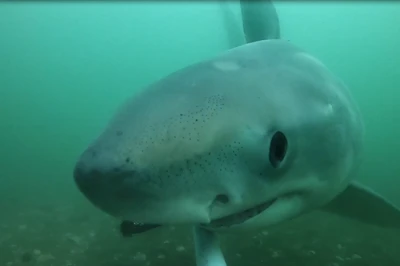
Marine ecologist Dr Phil Ross is leading a team collaborating with local iwi to investigate an increase in great white sharks in Bay of Plenty waters.
Marine biologist Dr Phil Ross is leading a team in collaboration with local iwi, to investigate an increase in great white sharks in Bay of Plenty waters.
The region has recorded the most extended marine heatwave ever seen in New Zealand and while warmer waters have been cited as the reason great whites are attracted to the region, Dr Ross says it is not the only reason.
“This is what we will be looking at, as well as monitoring the number and location of sharks with satellite tagging,” he said.
Researchers at the University are also striving to create sustainable business opportunities for rural coastal communities from farming flounder to regenerating mussel beds and creating sustainable mussel farming solutions from cabbage tree and flax fibers.
They are also focused on uncovering what sustainable healing medicines and products we can harness from the deep blue. Of high relevance to Aotearoa New Zealand, is discovery and development of agrichemicals from marine bioactive sources that provide new environmentally ‘friendly’ alternatives to current herbicides, with a focus on economically and culturally important biosecurity threats such as Kiwifruit Psa-V and Phytophthora.
“New Zealand’s natural marine environment has played an important role in the discovery of many important drugs and continues to be an important resource for drug and agrichemical leads,” says Professor Battershill, who heads the Coastal Marine group in the School of Science at the University of Waikato’s Tauranga campus. “It is enormously productive and an essential element in our well being and economic future, however it is under severe pressure here and around the world.”




